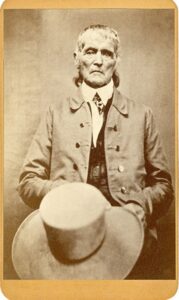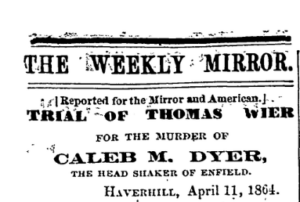Plenty of people own Shaker furniture or have heard of Shaker-style craftsmanship, but it's less common to find someone with Shaker ancestry. There’s good reason for that: the Shakers, or the United Society of Believers, were a Christian religious sect that believed in gender equality, pacifism, and complete celibacy—no marriage or children. They first arrived in the U.S. from England in 1774 and settled in villages throughout the Northeast and Midwest, where they lived communally, kept separate from "the world" of nonbelievers, and worshipped through song and dance.
Shakers didn't hold with violence, so I was intrigued to come across the story of Caleb Marshall Dyer, believed to be the only Shaker murder victim in history. A respected leader in his community, he was killed in a dispute with a local man over custody of the man’s daughters, who had been entrusted to the Shakers of Enfield for a period of time. Ironically, I only became aware of Caleb Dyer because of his involvement in an earlier custody dispute—that time not as a community leader, but as one of the children in question.
Caleb Dyer was born in New Hampshire in 1800 to Mary Marshall and Joseph Dyer. When he was a child, his father brought the family, including Caleb and his four younger siblings, to join the Shaker village at Enfield, New Hampshire. This was typical—as Shakers did not have families and thus no one could be born a Shaker, villages grew by taking in families and children, in the hopes that they would stay to adulthood and contribute to the community. In Caleb’s case, it worked. He became a dedicated lifelong believer, working his way up in the hierarchy of the village ministry to become Trustee of the Enfield Shakers, a top leadership role. He was in charge of making financial decisions for the village and dealing with "the world's people" to ensure that the Shakers were self-sufficient and prosperous. He was well respected both by other Shakers and by those he knew in the wider community—until, in 1863, he was shot and killed by a local man named Thomas Wier.
I came across Caleb's story when researching his mother, Mary (Marshall) Dyer, who was unhappy with her husband's decision to join the village at Enfield. She disliked the Shaker lifestyle and disapproved of their theological beliefs—but most importantly, she was distressed by the requirement that she live separately from her husband and no longer be considered mother to her children. Mary wrote numerous publications over the years, testifying about her experiences of mistreatment with the Shakers and asking for custody of her children. She remained staunchly anti-Shaker until her death.
But all Mary’s years of eloquent writing, agitation, and activism didn't win her children back. All five chose to remain with the Shakers until adulthood, and four died at Enfield. In a response to one of her anti-Shaker pamphlets, several of her then-adult children, including Caleb, testified to their belief in Shakerism and their intent to remain at Enfield village. I became curious about what happened to the Dyer children—leading me to Caleb's death certificate, which listed his cause of death as "shot by Thomas Wier." I was intrigued, and started digging in New Hampshire newspapers.
In 1861, the Enfield Shakers took in Sarah and Ellen Wier, the two young daughters of Thomas Weir. It was common for parents who couldn't take adequate care of their children to make this sort of arrangement, trusting the Shakers to feed, house, and educate them instead. The girls' mother was unwell, and their father was leaving to serve in the Civil War with the 5th New Hampshire Infantry. According to newspaper articles at the time, Thomas Wier signed an indenture: giving the Shakers custody of his daughters until such time as he could take them back, as long as the children consented to leave.
When Thomas Wier was discharged in 1862 and returned for his daughters, he was informed by Trustee Caleb Dyer that the Wier girls did not wish to see him. According to an account of Wier's eventual murder trial in the Manchester Weekly Mirror, Wier began behaving erratically after his return from the battlefield, replicating drills in farm fields with a hoe instead of a gun, loudly singing and swearing in public, and making increasingly desperate threats against Enfield and Caleb Dyer for keeping his daughters away from him.
The situation came to a head on 18 July 1863, when Wier visited Enfield, seeking Dyer out and asking again to see his daughters. When Dyer refused, Wier shot him in the side and ran. Despite the best efforts of two local doctors, Caleb Dyer died from his wounds three days later on 21 July.
The altercation between Caleb Dyer and Thomas Wier was not the only time that the Shakers faced violence from angry outsiders. Mobs have been raised against Shaker villages by parents seeking the return of their children, by ex-Believers seeking compensation for work they had done as Shakers, and by those who found the Shaker's unusual doctrine suspect. A Shaker elder being shot in cold blood, however, was highly unusual. Dyer's murder made headlines across the Northeast. Few, if any, of these articles mention that Dyer himself and his family had been involved in a similar parent-child dispute decades earlier.
In part due to their reliance on recruiting new Believers rather than raising children of their own, the Shakers declined in prominence throughout the late 19th and early 20th centuries. The last Shakers left Enfield in 1927, and today there are only a handful of living Believers. But while Shakers weren't allowed children of their own, their beliefs and interactions with the outside world affected generations of families.

